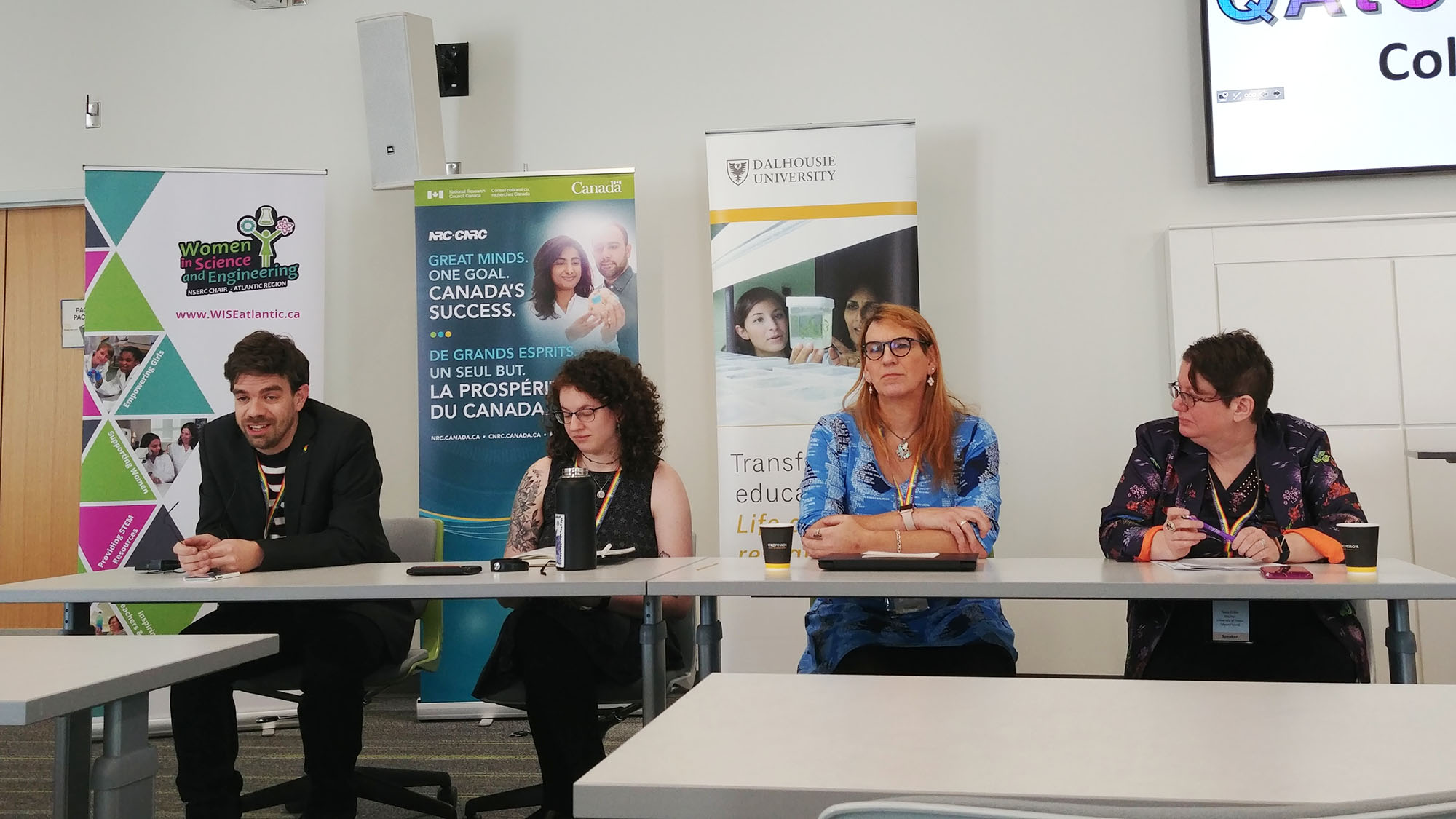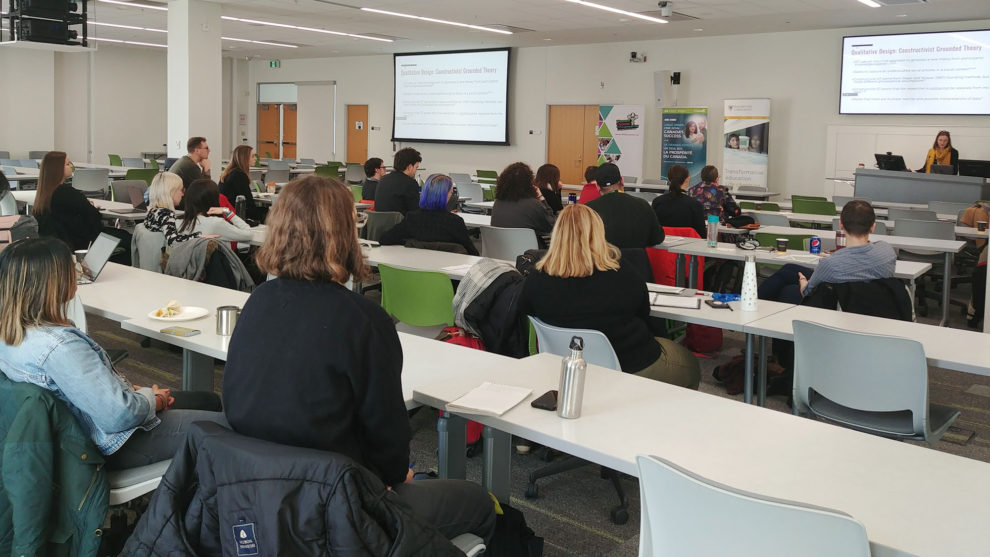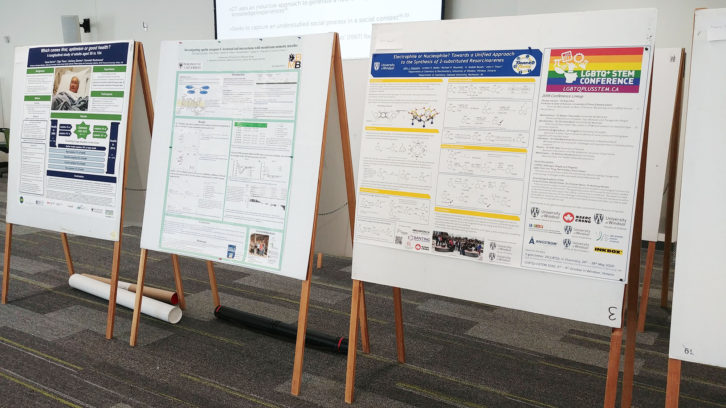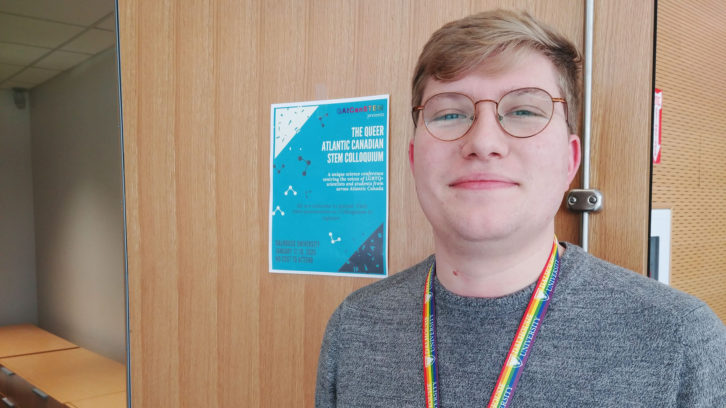Halifax event connects queer voices in STEM
The inaugural QatCanSTEM Colloquium was held this weekend at Dalhousie University

caption
Alexander Bond, Rachel Clarke, Tami Meredith, and Nola Etkin take part in a panel discussion at the QatCanSTEM Colloquium.Alexander Bond only met two other scientists who were openly ‘out’ during his 13 years of post-secondary education in Canada.
He’s now the senior curator in charge of birds at the Natural History Museum in London, England. He was in Halifax this weekend as a keynote speaker and panelist at the QatCanSTEM Colloquium.
The inaugural event, held at Dalhousie University, brought together queer voices from around the Atlantic provinces and beyond who are studying or working in the science, technology, engineering and math (STEM) fields.
“In Canadian academia as an undergraduate, masters, PhD, and two postdocs, to meet only two other out LGBTQ professors or faculty or people that could act as mentors, I found really quite isolating,” said Bond during the panel discussion titled “2SLGBTQ+++ in STEM: Experiences and Mitigations.”
Bond described moving to London and discovering events connecting LGBTQ+ scientists as “completely revolutionary.”
“The fact that there were other people like me doing other things like me, having the same discussions,” Bond said. “I don’t think that can really be understated.”
‘It is getting better’
Others on the panel were Nola Etkin, interim dean of science at the University of Prince Edward Island, Tami Meredith, an instructor with Dalhousie’s department of computer science, and Rachel Clarke, a master of science candidate at Acadia University.
While they agreed there has been a lot of improvement over the past 20 years for queer people in STEM, they said there are still issues that need to be addressed.
As a trans person in academia, Meredith described being “silenced.”
“When I first transitioned, it was at a university setting and I was told, ‘Don’t tell the faculty, don’t e-mail and tell them what’s going on, just let them find out themselves in their own way,’” she said.
“That said, I wouldn’t change my life for anything, I wouldn’t leave the university setting. It is getting better and I’m hoping that what I’m doing as faculty today makes it possible for you five, 10 years from now.”

caption
35 to 40 students attended the event.Etkin described herself as living a double life in the past — a professor at the University of Prince Edward Island by day, “activist superhero” by night.
“We silence ourselves and sometimes we do that out of necessity,” she said. “But for me, I think it was this misguided sense of not wanting to be seen as unprofessional, not wanting to make my students uncomfortable,” Etkin said.
“And it’s really only in the last two or three years that I’ve challenged myself on the notion that I need to keep the queer out of chemistry.”
In terms of what can be done to improve the experiences of queer people in STEM in the short term, Meredith used the conference as an example of making positive change.
“Just simply being here today, this conference made us noticed. It made it painfully aware to many people outside of the community that there are queer people in STEM, that we exist and we want to be noticed, we want to be accepted,” she said.
“And that’s a form of activism, simply being here and participating today.”

caption
Some students displayed their research on posters.Kyle Parkinson travelled from Ontario’s University of Windsor to attend the event.
“I only came out three years ago, and so I’m still finding my footing in terms of finding other people like me and I thought this would be a really good way to do that,” he said.
Parkinson is an integrated biology student doing master’s research on the impacts of climate change on seabirds. Parkinson said he was happy to be in a room full of people he felt comfortable with.
Lily Barraclough is an environmental science student at the University of King’s College and will be starting a master’s degree in September. She hopes to see a lot more of these events.
“I think it’s really great to hear from people who have been in academia and out in academia for decades, and to hear how things have changed in some ways, but also a lot of the barriers that remain,” said Barraclough.

caption
Landon Getz is a PhD student in Dalhousie’s microbiology and immunology department and the main organizer behind the QatCanSTEM Colloquium.Conference organizer Landon Getz said there were between 35 and 40 students who attended.
He was happy to see the wide range of scientific disciplines represented at the conference, although he hopes to engage more engineering and math students next year.
Another plan is to hold the conference in neighbouring provinces, he said.
“Eventually the idea is that once this is cemented as an official thing, we’ll be able to move it around,” said Getz.
That would help ensure more students get an opportunity to attend as not all can travel. He said overall, he was happy with how the conference turned out.
“It was really about building community and holding space. I think we’ve done that successfully,” he said.
About the author
Alexandra Skultety
Alex has worked in the radio industry for over 10 years at stations throughout BC and central Alberta. She has a Bachelor's Degree in political...
